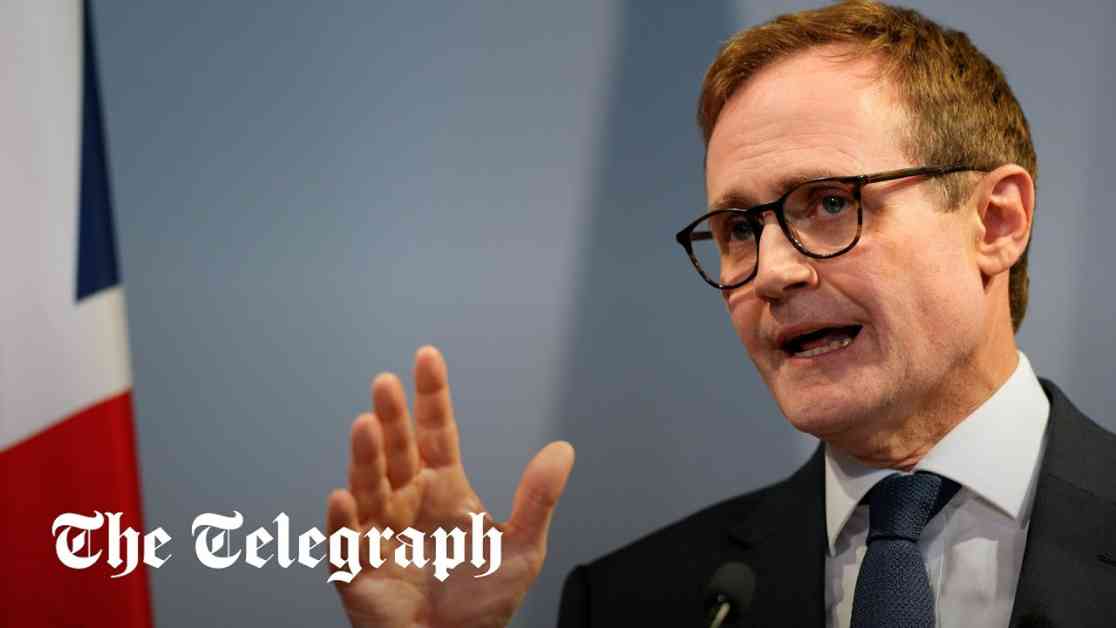Tom Tugendhat, a prominent figure in the Conservative Party, has officially launched his bid for Tory leadership. The former security minister is set to address the public and media, with a Q&A session expected to follow his speech. Tugendhat joins a pool of candidates vying to succeed Rishi Sunak, including Kemi Badenoch, Robert Jenrick, Dame Priti Patel, James Cleverly, and Mel Stride.
Tugendhat’s campaign launch event featured merchandise bearing his name, including foam fingers for supporters to show their allegiance. The activist seen posing with Tugendhat merchandise reflects the enthusiasm surrounding his leadership bid.
In a recent opinion poll conducted by YouGov, Prime Minister Sir Keir Starmer’s favorability ratings have taken a hit, signaling the end of his post-election honeymoon period. The survey revealed an increase in the percentage of people who viewed Starmer unfavorably, while his favorable ratings dropped. This decline in favorability marks a significant shift since Starmer took office as Prime Minister.
Meanwhile, tensions have risen surrounding the UK’s decision to suspend certain arms sales to Israel. Israeli Prime Minister Benjamin Netanyahu criticized the move, calling it a “shameful decision” that would only strengthen Hamas. The decision has sparked backlash from various quarters, with some viewing it as a betrayal of a key ally.
Dame Priti Patel, a Tory leadership contender and former home secretary, condemned the UK government’s suspension of arms sales to Israel as a “shocking betrayal.” Patel accused the government of playing politics with Israel’s security and capitulating to hard-left Labour MPs. She highlighted the decision’s detrimental impact on national security under the current leadership.
Israel’s foreign minister, Israel Katz, expressed disappointment with the UK’s arms sales suspension, stating that it sends a problematic message to Hamas and its supporters in Iran. The decision has strained relations between the two countries, with Israel emphasizing its commitment to defending itself against terrorist threats.
As the political landscape continues to evolve, Defence Secretary John Healey has signaled potential cuts to defense projects as part of Labour’s efforts to address the country’s financial challenges. He emphasized the need for tough choices to balance the budget and support economic growth, underscoring the government’s commitment to rebuilding the nation’s wealth and public services.
In response to criticism from Boris Johnson, Healey defended the UK’s decision to suspend arms sales to Israel, stating that it was not about favoring any side but upholding the rule of law. He clarified that the timing of the announcement was driven by parliamentary proceedings and the need to report the findings of the government’s review on arms export licenses.
Despite the suspension of certain arms sales, Healey reaffirmed the UK’s unwavering support for Israel’s security interests. He emphasized that the decision was not a political gesture but a legal obligation to ensure compliance with export regulations. Healey stressed the government’s commitment to standing by Israel as a staunch ally in the region.
The decision to suspend arms exports to Israel has sparked debate within the political sphere, with differing opinions on the extent of the ban. While some advocate for a complete halt to arms sales, others argue for a more targeted approach based on the specific items used for offensive purposes in conflict zones. The government’s stance reflects a careful balance between legal obligations and diplomatic considerations.
Former defence minister Tobias Ellwood suggested that the US would have approved the UK’s decision to suspend arms sales to Israel, indicating a coordinated approach between the two allies. He characterized the move as symbolic rather than impactful on Israel’s military capabilities, highlighting the nuanced nature of arms export controls.
In conclusion, the political landscape continues to shift as key players navigate complex international relationships and domestic challenges. The decision to suspend arms sales to Israel underscores the delicate balance between legal obligations, diplomatic considerations, and national security interests. As the debate unfolds, leaders must navigate these complexities to uphold principles of law and international relations while ensuring the safety and security of all parties involved.












